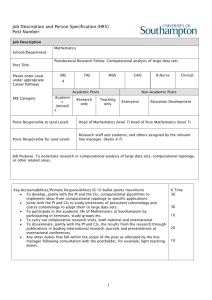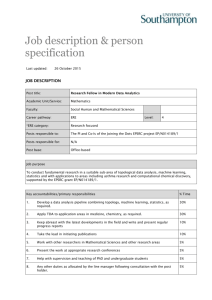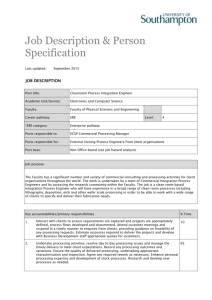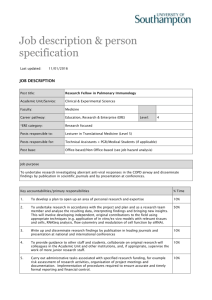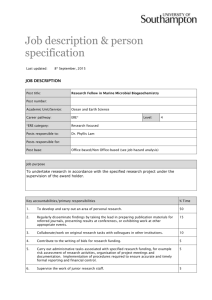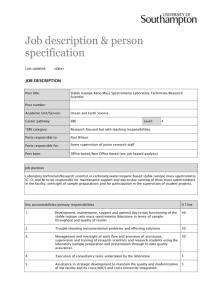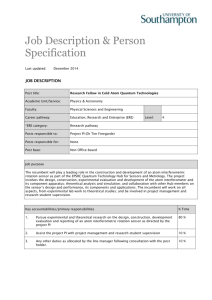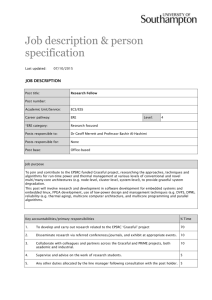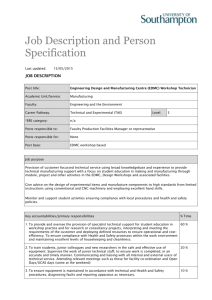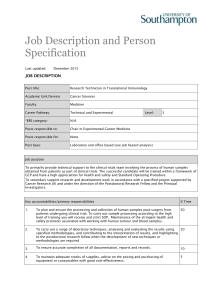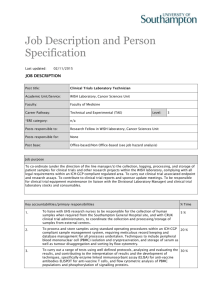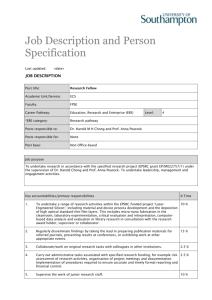Job Description and Person Specification
advertisement
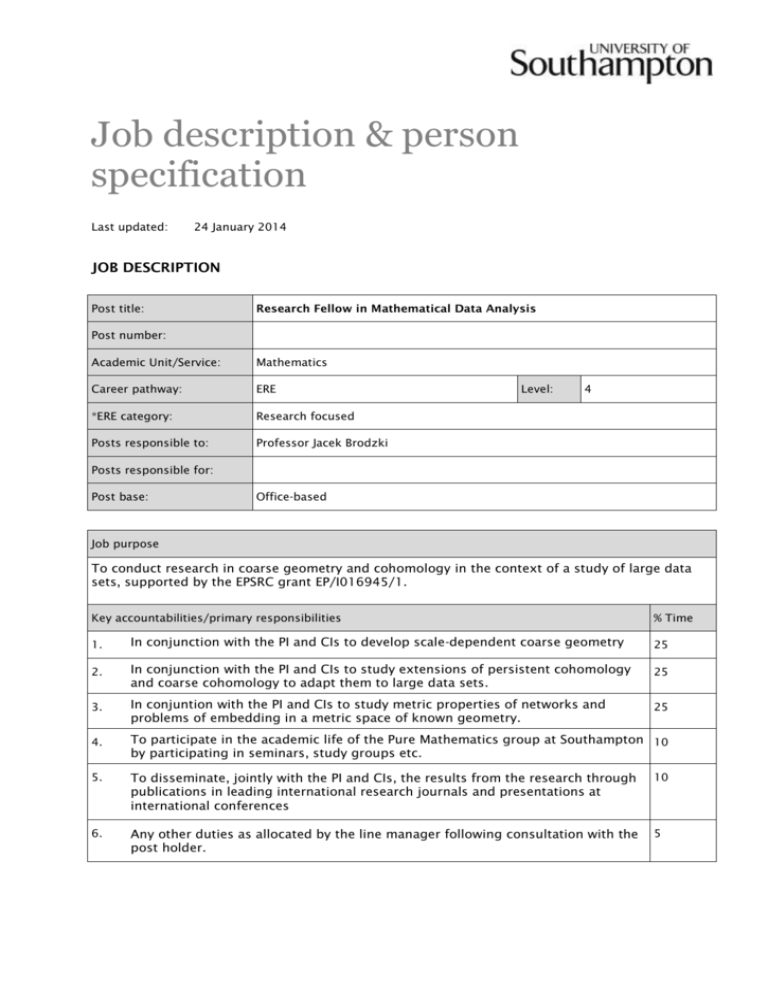
Job description & person specification Last updated: 24 January 2014 JOB DESCRIPTION Post title: Research Fellow in Mathematical Data Analysis Post number: Academic Unit/Service: Mathematics Career pathway: ERE *ERE category: Research focused Posts responsible to: Professor Jacek Brodzki Level: 4 Posts responsible for: Post base: Office-based Job purpose To conduct research in coarse geometry and cohomology in the context of a study of large data sets, supported by the EPSRC grant EP/I016945/1. Key accountabilities/primary responsibilities % Time 1. In conjunction with the PI and CIs to develop scale-dependent coarse geometry 25 2. In conjunction with the PI and CIs to study extensions of persistent cohomology and coarse cohomology to adapt them to large data sets. 25 3. In conjuntion with the PI and CIs to study metric properties of networks and problems of embedding in a metric space of known geometry. 25 4. To participate in the academic life of the Pure Mathematics group at Southampton 10 by participating in seminars, study groups etc. 5. To disseminate, jointly with the PI and CIs, the results from the research through publications in leading international research journals and presentations at international conferences 10 6. Any other duties as allocated by the line manager following consultation with the post holder. 5 Internal and external relationships (including nature and purpose of relationships) PI – collaborative research work and regular meetings to discuss progress CI – collaborative research work Members of the Pure Group and the School of Mathematics, SOCIAM group within ECS PERSON SPECIFICATION How to be assessed Criteria Essential Desirable Qualifications, knowledge & experience PhD (or equivalent) in Pure Mathematics Knowledge of an area of modern CV, data analysis, interest in direct references, applications of pure mathematics interview Research track record in a sufficiently closely related field (including, e.g., harmonic analysis on discrete metric spaces, or coarse geometry or persistent cohomology Experience in topological methods for data analysis, e.g., persistent homology Mathematical programming skills and an interest in possible applications of pure mathematics to practical problems Planning & organising Ability to conduct research both independently and in collaboration with peers CV, references, interview Ability to organise own research activities to deadline and quality standards Problem solving & initiative Ability to develop understanding of complex problems and apply in depth knowledge to address them Management & teamwork Willingness to work in a research team Communicating & influencing Good communication skills, both written and oral; ability to write up research results for publication in leading peerreviewed journals CV, references, interview Experience with collaborative work CV, references, interview CV, references, interview Other skills & behaviours Special requirements Document1 2 JOB HAZARD ANALYSIS OFFICE-BASED POST If this post is an office-based job with routine office hazards (eg: use of VDU) no further information needs to be supplied. NON-OFFICE BASED POST If this post has some hazards other than routine office (eg: more than use of VDU) please complete the analysis below. ## - HR will send a full PEHQ to all applicants for this position. ENVIRONMENTAL EXPOSURES Occasionally Frequently Constantly (<30% of time) (30-60% of time) (> 60% of time) Outside work Extremes of temperature (eg: fridge/ furnace) ## Potential for exposure to body fluids ## Noise (greater than 80 dba - 8 hrs twa) ## Exposure to hazardous substances (eg: solvents, liquids, dust, fumes, biohazards). Specify below: Frequent hand washing Ionising radiation EQUIPMENT/TOOLS/MACHINES USED ## Food handling ## Driving university vehicles(eg: car/van/LGV/PCV) ## Use of latex gloves (prohibited unless specific clinical necessity) ## Vibrating tools (eg: strimmers, hammer drill, lawnmowers) PHYSICAL ABILITIES Load manual handling Repetitive crouching/kneeling/stooping Repetitive pulling/pushing Repetitive lifting Standing for prolonged periods Repetitive climbing (ie: steps, stools, ladders, stairs) Fine motor grips (eg: pipetting) Gross motor grips Repetitive reaching below shoulder height Repetitive reaching at shoulder height Repetitive reaching above shoulder height PSYCHOSOCIAL ISSUES Face to face contact with public Lone working ## Shift work/night work/on call duties Document1 3
